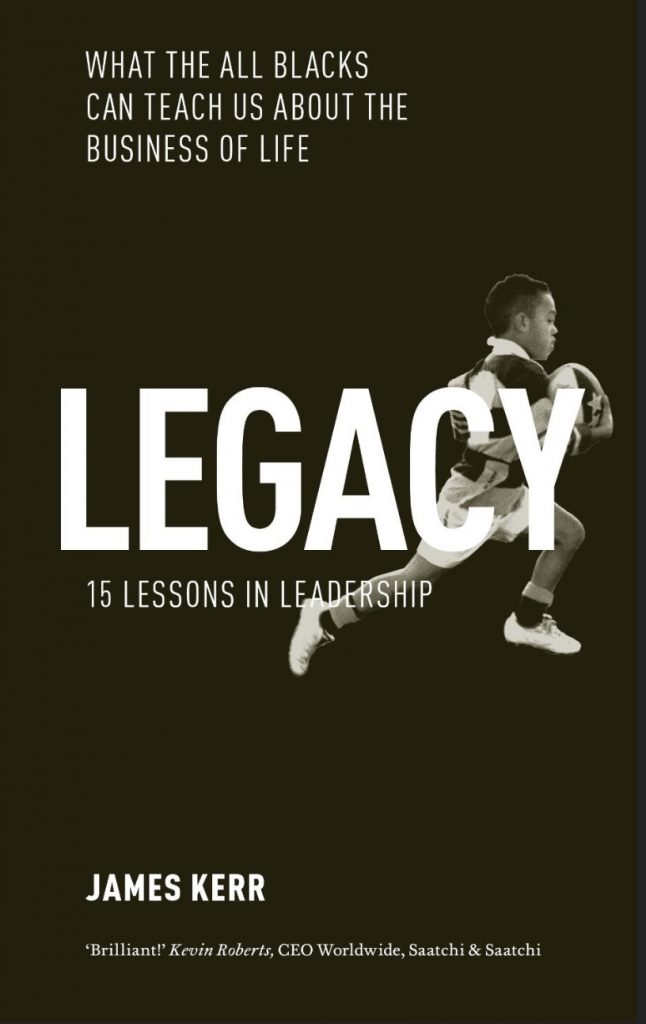Key Quote:
“Enlightened leadership promotes a structured system for the development of the team, combined with a tailored map for the development of the individual” (p. 61). — James Kerr
Key Points and Concepts
Training and Performance
Go for the Gap. When you’re on top of your game, change your game.
The All Blacks aren’t shy about borrowing from other disciplines. Whether it’s from business, the military, or other sports, if it makes them better, they’ll do it.
Focus on marginal gains. When you’re operating at an elite level, there shouldn’t be opportunities to do things 100% better. Instead, find 100 things that you can do 1% better to create a cumulative advantage (p. 67).
In order to adapt, you need to first observe and gather feedback. You can’t successfully adapt if you don’t understand what’s driving the need to do so.
Kevin Roberts, CEO of Saatchi & Saatchi, has built a simple yet effective system that allows him to receive constant feedback on how he’s doing against his goals. First, write a list of 10 things you would like to get done in the next 100 days. Use no more than three words and begin each item with a verb. Each item needs to be actionable, and it needs to be a stretch. Review your list every Friday morning and measure where you are against what you want to accomplish. Based on this review, decide if and how you need to adapt (p. 28).
Play with Purpose. Ask ‘Why?’
In a fit of extreme depression, the architect Buckminster Fuller found himself asking this question: “What is my job on the planet? What is it that needs doing, that I know something about, that probably won’t happen unless I take responsibility for it?” (p. 8).
Embrace Expectations. Aim for the biggest cloud.
A fear of failure is good, it’s healthy. Use it to motivate proper preparation (p. 88).
“Muhammad Ali began calling himself the greatest before he had any real right. ‘It’s the repetition of affirmation that leads to belief’ he says, ‘and once that belief becomes a deep conviction, things begin to happen’” (p. 91).
Train to Win. Practice under pressure.
The ability to stand up against pressure is a skill like any other—it needs to be practiced and honed. If you know that you’ll be in a high-pressure situation, find ways to simulate it by gradually building levels of pressure into your practice so that you are acclimated to it (p. 106).
Keep a Blue Head. Control your attention.
Develop anchors. Find small words, phrases, or actions that help orient yourself and your actions during moments of high stress. They help you recalibrate and reboot in moments of pressure (pp. 116-117).
Know Thyself. Keep it real.
“If our values, thoughts, words and actions are aligned, then our word is our world. With accuracy of action, less slippage occurs between thought and deed. In knowing ourselves, we live our vision. By being our word, we make it happen” (p. 130).
Sacrifice. Find something you would die for and give your life for it.
When All Blacks join the team, they are brought in front of their teammates and asked the question “What can I offer? What will I sacrifice?” (p. 133).
Building a Culture
Sweep the Sheds. Never be too big to do the small things that need to be done.
After everyone has had the opportunity to speak, following in the tradition of the Maori meetinghouse, each player grabs a broom and cleans up after themselves—they literally “sweep the sheds.” It’s about “not expecting somebody else to do your job for you. It teaches you not to expect things to be handed to you” (p. 7).
“Sweeping the sheds” isn’t the secret to winning every single game, but it develops the type of personal character that makes the All Blacks successful over the long haul.
“The way you behave will either bring out the best or worst of your capability” (p. 10).
Create a Learning Environment. Leaders are teachers.
Beginning in 2004, during one of the worst stretches of performances in their history, the All Blacks adopted a philosophy ground in an old Maori proverb: “Let the questioning continue; the ability of the person is in asking questions.” The purpose of asking questions, even as fundamental as what it means to be an All Black, is to “cut away” unhelpful beliefs that prevent us from finding clarity (pp. 14-15).
“What man actually needs is not a tension-less state but rather a striving and struggling for a worthwhile goal, a freely chosen task” (p. 37).
“Enlightened leadership promotes a structured system for the development of the team, combined with a tailored map for the development of the individual” (p. 61).
Richie McCaw, one of the most prolific and successful All Blacks of all time, keeps a notebook full of mantras, reminders, and quotes he likes. On game days, McCaw opens his notebook and writes the same thing at the top of the page – “Start Again” – as a reminder that you have to prove yourself again, today (p. 94).
No Dickheads. Follow the Spearhead.
When hiring someone or bringing them onto a team, don’t focus just on their skillfulness. Focus on what they believe from the inside out. “If you hire people who believe what you believe, they’ll work for you with blood, sweat and tears” (p. 40).
When birds fly in the shape of a spearhead, they are as much as 70% more efficient compared to when they fly solo. When one bird drops out, they fall behind, and it disrupts the efforts of the other birds. The formation only works when every bird is where it’s supposed to be (p. 75).
Invent a Language. Sing your world into existence.
“Language is pivotal to winning, language sets the mental and physical frame for victory…A team of ‘followers’ is immediately on the back foot. A team of leaders steps up and finds a way to win” (p. 50).
Wayne Smith, after leaving the All Blacks to join the New Zealand Chiefs, completely recalibrated the language of the team. Smith integrated Maori culture into everything the team did, from how he named different plays and actions to a preseason trip that retraced the steps of local Maori tribes. By imbuing his team with a common language, a common understanding, Smith created a coherent and cohesive culture for the team to buy into and thrive in (p. 149).
Ritualize to Actualize. Create a culture.
At the end of each game, the All Blacks sit together, without media presence or interruption, and each player is “given the opportunity to speak, to say their truth, to tell their story” (p. 5).
Under Graham Henry, who led the All Blacks during their period of resurgence from 2004-2011, the All Blacks engaged in near constant storytelling. They did so to emphasize the fact that they belonged to something bigger than themselves, than this team at this moment. They were part of the story of the All Blacks that spans generations, and it is their job to add to that story, to that legacy (p. 42).
“Great stories happen to those who tell them” (p. 94).
In 1999, the All Blacks were sliding. They had lost five games in a row and had lost a sense of identity. In response, two recently retired players, John Kirwan and Sean Fitzpatrick, decided to write a book. This book became known as “The Black Book,” and put the collective wisdom of the All Blacks in a single place. It contains phrases such as: “Work harder than an ex-All Black,” “It’s an honor, not a job,” and “Leave the jersey in a better place” (p. 143).
Leave Your Legacy
Pass the Ball. Leaders create leaders.
A poor neighborhood in London suffered from a deluge of petty crime, committed by younger gang members. Fed up, a local man started a soccer tournament for disaffected youth in his neighborhood. He started by targeting “alpha-males” in the community, ones who he thought would be susceptible to falling in with a gang. He named them managers. The newly named managers were then responsible for naming a captain, and the captain responsible for picking a team. Team members had one responsibility—show up to every game on time, or else the team, not the individual, would be disqualified from the tournament. On the first night of competition, the organizers expected about ten teams to show up. Fifty-two arrived. Zero teams were disqualified over the four-week tournament, and the program, Teenage Kicks, is still going strong (p. 47-48).
Be a Good Ancestor. Plant trees you’ll never see.
“They also play for All Blacks yet to be born. Fatherhood is an important theme within the All Blacks; this handing down of knowledge across the generations, this stewardship of the future” (p. 171).
Write Your Legacy. This is your time.
When a player makes the All Blacks, they’re given a small, black book, bound in leather. The book is filled with images of jerseys from past All Blacks, the principles of the team, its ethos, its character, its heroes. The last few pages have none of these—they’re blank. They wait for you to add to the story, to the legacy of the All Blacks (p. 183).

Focus on marginal gains. When you’re operating at an elite level, there shouldn’t be opportunities to do things 100% better. Instead, find 100 things that you can do 1% better to create
a cumulative advantage.
A poor neighborhood in London suffered from a deluge of petty crime, committed by younger gang members. Fed up, a local man started a soccer tournament for disaffected youth in his neighborhood. He started by targeting “alpha-males” in the community, ones who he thought would be susceptible to falling in with a gang. He named them managers.
“They also play for All Blacks yet to be born. Fatherhood is an important theme within the All Blacks; this handing down of knowledge across the generations, this stewardship of the future.”
When a player makes the All Blacks, they’re given a small, black book, bound in leather. The book is filled with images of jerseys from past All Blacks, the principles of the team, its ethos, its character, its heroes. The last few pages have none of these—they’re blank. They wait for you to add to the story, to the legacy of the All Blacks.
